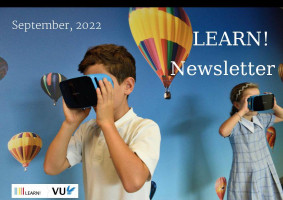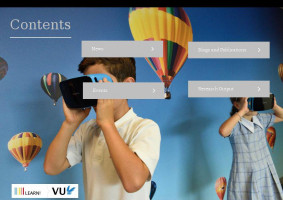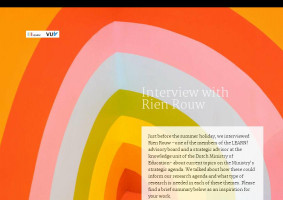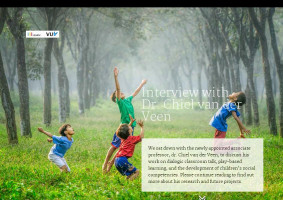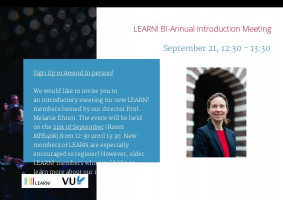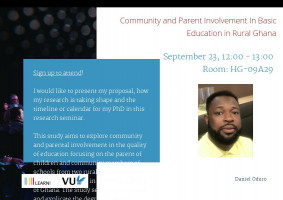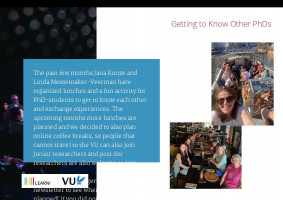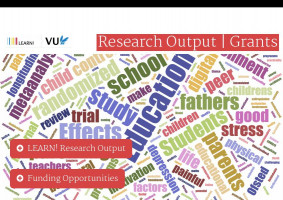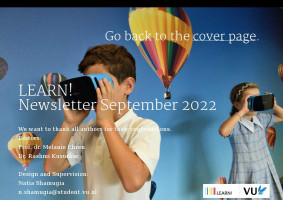Just before the summer holiday, we interviewed Rien Rouw –one of the members of the LEARN! advisory board and a strategic advisor at the knowledge unit of the Dutch Ministry of Education- about current topics on the Ministry’s strategic agenda. We talked about how these could inform our research agenda and what type of research is needed in each of these themes. Please find a brief summary below as an inspiration for your work.
_w380_h392_1.jpg)
(1)_w380_h434_1.jpg)
The Ministry of Education has currently set four priorities areas for primary and secondary education:
- Basic skills (reading, mathematics)
- Equity
- Teachers (reducing teacher shortages by providing more attractive salaries and enhancing career structures)
- Social safety or safety in schools (meant to promote safety for all students, with specific attention paid to LGBTQIA+ students).
In some of these areas there are already specific policies in place, while other areas are in the process of developing a policy agenda. Particularly for basic skills there are specific strategies in place to improve children and young people’s literacy and mathematics skills, as well as their digital skills and citizenship. The ministry has also outlined a policy to improve equity through school-community partnerships with further policies soon to be presented. Finally there are policies in place to reduce teacher shortages and improve teaching quality as well as ensure social safety in schools.
The idea of school-community partnerships is relatively new for the Netherlands. What type of partnerships does the Ministry hope to promote?
The policy of School and Community is directed at areas consisting of coalitions of schools, youth services, sports clubs, and libraries which can select the activities that would benefit the schoolchildren in their area. This is where researchers could come to our aid: we would like to know whether coalitions are genuinely effective at enriching children's educational experiences through extracurricular activities. In this vein, with a coalition of frontrunners, we are launching research-based pilots of such interventions.
These partnerships should have a wide range of benefits that fall within the other policy areas, such improving basic skills, equity, citizenship but also ensure a more inclusive learning environment for students. As stated in our policy documents, "it is our ambition that all children and youngsters can be free to be themselves." The need for further measures to ensure inclusiveness comes from the fact that LGBTQIA+ students experience more psychological problems and are more frequently bullied than other students. Schools must create safe environments for all pupils, but some of our data and conversations with young people indicate that schools do not seem to succeed. They talk about being bullied or feeling disconnected from school when their experiences are not discussed or recognized. A safe school climate is a standard in the inspection framework, but given the autonomy of schools who can choose their own mission and vision, this is a difficult topic to address nationally. We have already seen some conflicts where tension exists between the freedom to express oneself as an LGBTQIA+ student and the Christian schools trying to suppress such expression. The inspection signals that this conflict violates the Dutch citizenship laws.
Teacher shortages are another major concern for many schools. What is the Ministry trying to do to address this?
Even though the ministry has done a lot to combat this problem, the shortages are getting worse. Thus, the ministry is now exploring unorthodox methods to resolve this issue. Some of these methods would require us to leave the classical classroom model behind, organize the school differently, and make strategic use of digital tools. Before schools are ready for such extensive changes, we need to rethink how we teach and the types of methods and instructional strategies we are using. How can we organize schools more efficiently while ensuring high learning outcomes? There is a concern that when we start innovating and finding new models, that this is creating additional burdens on schools, but equally it could energize the school and attract more teachers. This is another fruitful area for research. We can ask what happens during significant reorganization: do schools suffer, or are they re-energized?
Connecting the dots…
Finally, all these policies are interconnected and need to benefit the development of children in school through a whole-child approach. The whole-child approach entails exploring how all the policies we implement to promote basic skills, equity, safety, and well-being interact with one another and promote a more healthy child development. Research exploring such crossovers between interventions over an extended period of time would be valuable for the Ministry. We know that it is difficult to fund longitudinal research, but would encourage academics to use existing data repositories for longitudinal work. One example is the education monitor in Limburg, which has been following students from primary to higher education. Such longitudinal data can be highly informative to the ministry.
